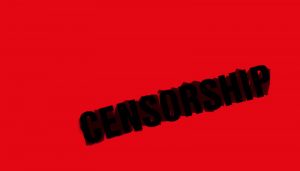Kenan Malik in Pandaemonium:
 One of the problems in discussing censorship is that we often don’t recognize censorship for what it is. There is no longer the Lord Chamberlain marking scripts and cutting out the unacceptable. Instead, we, in effect, ourselves mark them. And that, ironically, makes censorship not more, but less, visible.
One of the problems in discussing censorship is that we often don’t recognize censorship for what it is. There is no longer the Lord Chamberlain marking scripts and cutting out the unacceptable. Instead, we, in effect, ourselves mark them. And that, ironically, makes censorship not more, but less, visible.
In all my years campaigning for free speech, I’ve rarely heard anyone say ‘I’m for censorship’. Rather what many say is ‘I’m for free speech. But…’ I’m for free speech… but speech must be used responsibly. I’m for free speech… but speech should not offend. I’m for free speech… but don’t appropriate from other cultures. And so on. What was once recognized as straightforward censorship has now become a combination of moral obligation and social etiquette.
Even those who openly call for censorship often dress it up in moral terms. Thirty years ago, back in the midst of the Rushdie affair, Shabbir Akhtar, spokesman for the Bradford Council of Mosques, insisted that the real debate was not about ‘freedom of speech versus censorship’ but about ‘legitimate criticism versus obscenity and slander’. Exactly the same point has been made by every opponent of offnsove talk, from those who shut down Gurpreet Kaur Bhatti’s Behzti to those who would have shut down Caryl Churchill’s Seven Jewish Children.
But who makes that judgment call? Who decides what is legitimate criticism and what is obscenity and slander? Half a century ago, the answer was: the Lord Chamberlain. Today, the answer is each of us.
More here.
